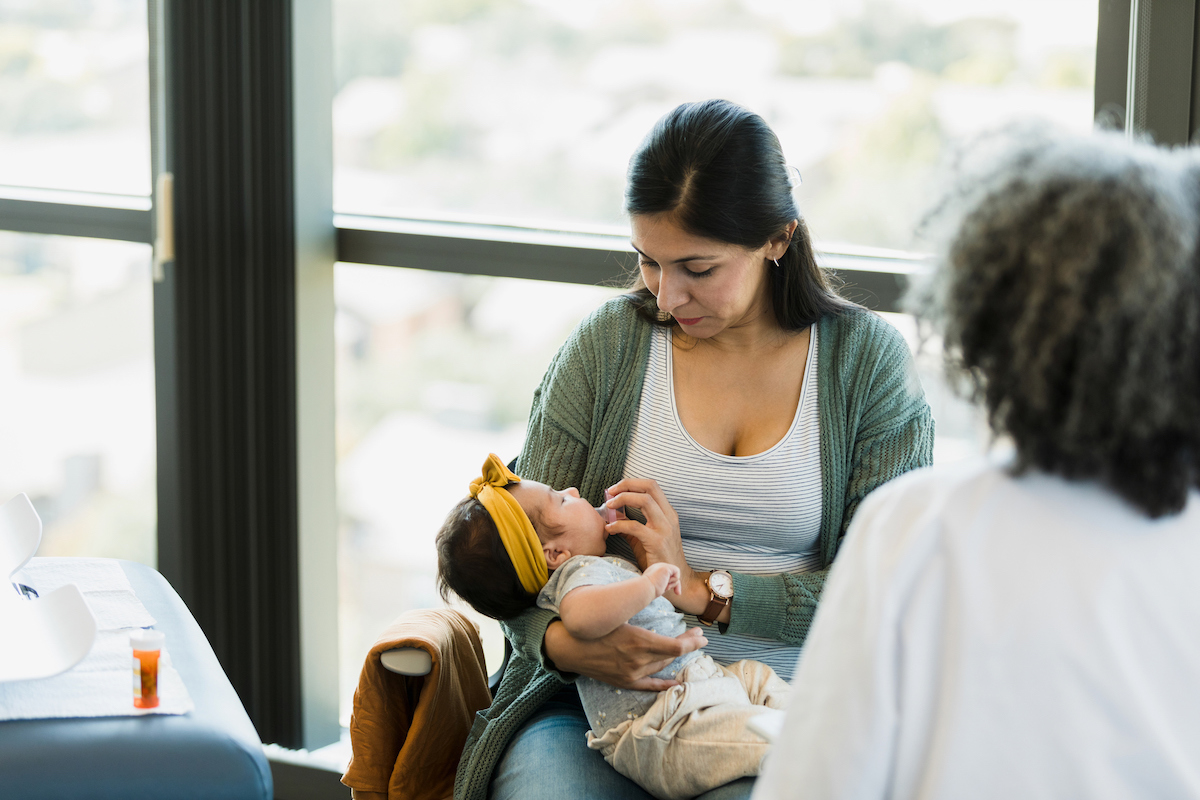When trying to conceive, taking care of your mental health can slip further and further down the list of priorities. I was excited to talk about this with someone whose work I admire, Dr. Pooja Lakshmin, a perinatal psychiatrist and a good friend. I’ll let her introduce herself below.
When I went to medical school, I thought that I wanted to be an OB-GYN. Then I did OB as my first rotation and realized very quickly that I had no interest in actually having my hands inside of other people’s bodies.
I actually did psychiatry as my last rotation, and pretty much within the first week, I was like, Oh, these are my people. I really liked hearing about what was going on in people’s lives outside of the medical stuff. Then when I went into psychiatry, I found that there’s actually a whole field that is focused on women.
It wasn’t until probably the 1980s or 1990s that perinatal psychiatry itself started to be a field and people started to do research on things like postpartum depression, hormones during pregnancy and postpartum, the interplay between how hormones impact mood, and the safety of medications. We still have a long way to go. The newest frontier is things like menopause and perimenopause, where we’re again seeing, as women, we’re having to really advocate for ourselves as we’re going through it, because so much of research has been done by men for men, about men.
Secondly, it allows me to be an advocate, because this is a field that is under-resourced. We constantly need to be shouting from the rooftops just how important women’s health and mental health is. It’s allowed me to write, publish books, and I get to be on a soapbox, which is something that I enjoy doing, as it turns out.
Navigating the TTC journey
On the various ways people tackle their personal conception journey, and the harm of trying things “just because.”
There is usually a period of time where you’re having to wait. Waiting is such a tough place to be. I find that my patients always feel a lot better if there is something to do while you wait. Whether that is buying ovulation strips and peeing in a cup every morning, or whether it’s figuring out what days of the month you’re having sex, or putting your legs up in the air, even though there’s no evidence for this. But it just feels better to have somebody saying, Here’s some things you can do.
How do you navigate that people want you to give them a million things to do, but some of those things just aren’t effective? How do you think about not giving in to the desire to recommend a bunch of random useless things to do?
I think it’s a little bit condescending for us to say “don’t,” because that doesn’t really help anybody, but there’s some things, like completely changing your diet — you don’t need to do that and that costs a lot of money, right? There’s even different apps and things that really are not evidence-based. So it’s a little bit of tough love. In some cases, I know it sucks to have to wait and try, but that’s what it is.
If you are somebody who ends up on an assisted-reproductive-technology journey, whether that’s IUI or IVF, then you may have huge amounts of uncertainty and have to make extremely technical decisions on very little information. In this place where there’s so much uncertainty and grief, you might be experiencing loss and even more waiting, because with IVF and IUI, you’re having to get procedures to see what’s going on in your body, what the uterine cavity looks like, what your hormone levels are. There’s just so much waiting, and then on top of this, you’re still having to live your regular life.
Managing stress and uncertainty
On ways to navigate this challenging time, by taking things off your plate.
One of the things that I tell my patients is: one, this is a hard period of time. It’s normal for you to be stressed right now and for all this to feel very overwhelming. We want to look at ways that you can be gentle on yourself. I like using that word, “gentle,” because I think for a lot of folks so much of this is hard. Let’s think about the ways that we can peel back some of the demands or burdens that you’re putting on yourself. So checking your schedule and looking at what’s going on for you professionally, or with maybe other kids that you might have. Johnny doesn’t need to do five different activities this spring, when I know I’m gearing up for IVF. I don’t need to be schlepping him around every single part of town; maybe he can do one activity.
What are the ways in which I can conserve some energy and put some of it back into myself? It sounds silly, but stretching, being in your body, going for a walk, sitting down and allowing yourself to enjoy your lunch, small things like that. How can we slow down? I don’t use the word “stress” that much, because trying to de-stress comes with too much pressure. I like to think of it as, how can we slow down? How can we be gentle? Basically, the fertility stuff is another full-time job that we’ve added into the mix of your daily life. That means, by definition, some of the other stuff has to move a little bit more slowly to make room.
This advice is actually: you can look at your life and ask, Where is the time I can take to slow down in these other aspects? It’s not to force myself to feel differently but to sit down at my desk and don’t do extracurriculars, which you don’t really need to do anyway.
I made the decision when I was going through IVF to cut back on alcohol but still drink coffee, because I need coffee to be a functioning human being. You should realistically look at what is being recommended, make sure that what you’re reading is good-quality, and be realistic with yourself. With the austerity measures, if you’re going to be miserable, if you’re going through an IVF process, likely this is going to be a yearlong process, right? I think it’s important to really understand yourself and know what you’re able to do, and not beat yourself up.
Navigating relationships when trying to conceive
On finding community to help you decompress or find solutions you may not have thought of before.
One of the things that I hear so often from my patients is just this feeling of guilt, when you’re going through your process and somebody close to you gets pregnant and you can’t be happy for them. Then there’s this guilt, like, Oh my gosh, I’m such a terrible person. I’m so selfish. This is my best friend in the world, I know she’s going to be an amazing mom, but it’s so unfair.
This is a situation where you need one space where you can be without grief, and you can have friends, a therapist, a coach, or a community. There are lots of communities out there where you can be totally unfiltered about your feelings of grief and how unfair life is. Then you can “show up,” but the thing about that is, this is another place for gentleness. You shouldn’t be expecting yourself to be the one who’s throwing the baby shower and going all out. You have to know yourself and know what is appropriate for you.
I have had patients who said, “I can’t, I’m not going to the baby shower.” Then we worked on the communication and what you can say to this friend. Something like “I just want to let you know that I’m so happy for you. I’ve just been going through a really tough time with my own infertility journey and my mental health, and I don’t feel like I’m in a good enough place to be there for the baby shower. But I love you so much.” Be able to be open and authentic like that. Now, the reality is, not every friendship will survive that, right? You find out the people in your life who are able to hold grief. There are some friends who are great friends, but they’re just there for the happy times. The same is true for family relationships too.
With early pregnancy losses, there’s something to be said for sharing with people who are close to you early on, so that if something happens, you do have that support. Again, all of that depends on the dynamics and whether you have a good relationship with your family. If you have the type of in-laws where you’re going to get a text every five seconds about how things are going and what are you eating? Then maybe you should tell them at the delivery, right? With IVF, because it’s so technical, it’s hard for people to understand that, because there’s so many steps — doing the cycles to get the eggs, testing the embryos — so you really have to titrate which pieces you share, how you share it, and who you share it with.
This is another place where it’s really helpful to have a community of other people who have been through it who you can troubleshoot and talk these things through with. One of the things that makes this particularly hard is every single person’s infertility journey is different. What worked for one person may not work for another. Some people are on the surrogacy track, some are on the donor egg track, there’s many different branches. You have to be aware that whatever information you’re getting from other people, whatever advice you’re getting, is clouded by their own experience. I don’t say that in a bad way. It’s how humans are.
Taking a break
On recognizing when you need a respite from doctor’s appointments and disappointment.
Sometimes people need to be reminded you can stop at any point; you don’t have to keep going. When it’s impacting your mental health in a way where people around you are really worried about you, people around you have really noticed that you’ve turned into a little bit of a different person — that could be another sign.
I will say, when my patients are in that place, it can be really hard to hear. It usually doesn’t happen right away; it’s a kind of grief process, right? Of coming to acceptance.
Mental health resources for TTC
While there are some resources for people to tap into, there’s still an opportunity for more spaces that cater to perinatal mental health and infertility.
There’s a huge amount that still needs to be done when it comes to mental health and infertility. We only recently, over the past few years, have put mental health during pregnancy and postpartum on the map, generally speaking. But the IVF process, the fertility process, younger folks, in their 20s or 30s, even things like egg freezing — there’s not really great resources. Again, why?
On the grief side, there’s not a ton. There’s Rainbow Families, a great resource but mostly a queer space.
Community Guidelines















Log in